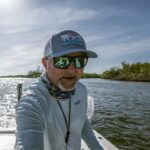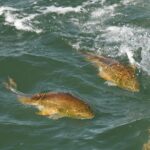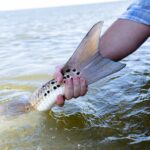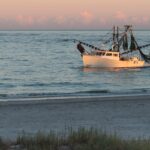
A Veteran Guide’s View of Jacks
If you’ve spent any time on the water in South Florida, chances are you’ve heard
Often the path to driving positive change is the most arduous. Consistently taking that path will result in some “losses”. Admittedly, it can be difficult to ask our advocates to keep fighting when winning doesn’t come around too often. Advocate fatigue is a real thing. This work requires honesty and transparency. Most of all it requires trust. A culmination of these dynamics turned the tide for traditional fisheries management just a bit yesterday.
The North Carolina state agency let us know that it’s been years since they received this many comments on an issue. This influx of passionate digital comments was followed by more than 20 guides and anglers giving thoughtful in-person testimony over the course of two days. You all absolutely made a difference. False albacore won because of your efforts. This is as profound as it is complicated. Lately, folks are taking victory laps on issues that aren’t wins for the resource. We aren’t going to do that. What we aim to do in this blog is give you game log for how this entire situation played.
On February 22nd, 2024, there was a North Carolina Marine Fisheries Commission meeting and false albacore was on the agenda. The item for discussion was guard rail management for albies. The three options were essentially do nothing, monitor the situation , or if landings exceed 200% of a five-year average, take action. That action would be implementing regulations including a 3500lb trip limit for commercial vessels and a 10 fish per person limit (max of 30 per vessel) for recreational vessels. The vote was close, but Option 3 (take action) passed. For the very first time, false albacore finally have some level of state management.

North Carolina did a fantastic job with the proposal and the process. The agency did not support Option 3, but they did lay the groundwork for the opportunity and the discussion. North Carolina is a difficult state when it comes to conservation. What they showed at this meeting is that they are aiming to operate a fair process, and that is way more than you can expect for other state agencies along the coast. They also showed us how smart and professional they are. We look forward to working with North Carolina on many fisheries issues moving forward. Albies have a brighter future because North Carolina gave the public a chance to have a say on this issue. That’s all you can ask. So on behalf of the resource and the entire community that relies on it, thank you.
Our discussion about the specifics of Option 3 should be transparent. Using “200% of landings” to trigger management is not great as far as a single management process goes. That’s a pretty substantial harvest increase. That being said, we can’t look at this as a single management action. We must consider long term implications. Through that lens, we are witnessing a paradigm shift in management. False albacore had no limits, no daily quota, no yearly quota and almost no science – until this community united. The goal all along was to put stop gap measures in place before things begin to spiral. That is exactly what happened.

ASGA could not be more grateful for the hard-working employees of North Carolina Marine Fisheries. We couldn’t be more pleased with the false albacore conservation community in the Atlantic. The guide community came out in force to provide in-person testimony. We would also like to thank North Carolina CCA for giving excellent testimony and providing the support needed to pass Option 3. David Sneed, Executive Director of CCA NC, showed eloquence and leadership at the podium. All of these things accomplished a massive long-term goal of precautionary fisheries management. Instead of kicking the can down the road and waiting for a crisis, there is now a system in place to avoid huge spikes in landings. As a conservation community, we must to take this momentum and run with it. Other states are watching the leadership in North Carolina, we can now use this win to leverage more wins for false albacore.
Option 3 was a win across the board. The resource has protection from massive spikes in harvest to protect future angling opportunities and commercial anglers are protected from large-scale operations developing. From our small team to our rapidly-growing community: THANK YOU.
Thank you for trusting us. Thank you for your time. Thank you for being the power in everything we do. This is bigger than you may realize. Even if it doesn’t seem like a lot today, the future is wide open.
Science Update: We are reviewing the data from year 2 of the Albie Project in partnership with the New England Aquarium. We are extremely excited to share the results in the coming days! What better timing to celebrate a bright future and better understanding of an amazing species.

If you’ve spent any time on the water in South Florida, chances are you’ve heard

Photo Credit: Graham Tayloe Big Win for Redfish in Alabama Huge news from the Marine

Feature Photo: Carter Abramson | Simms Fishing at the Fisheries Science Symposium We have more

Each year, hundreds of millions of fish are killed as collateral damage from large-scale, inshore
We rely on our members and donations to keep fighting for a sustainable tomorrow in marine conservation.
GIVE THE GIFT OF FISHERIES CONSERVATION THIS HOLIDAY SEASON. SHOP ASGA GOODS THAT FUND FISHERIES RESEARCH & ADVOCACY CAMPAIGNS
JOIN ASGA IN CALLING FOR CRITICAL MANAGEMENT ACTION AFTER YEARS OF SPAWN FAILURES & POOR MANAGEMENT.
By using this website, you agree to our use of cookies. We use cookies to provide you with a great experience and to help our website run effectively. To learn more, please review our privacy policy.
4 Responses
Thank you to all who has been involved in this issue. I feel ashamed that I have not been involved in this due to a life threatening situation I have been recovering from. I look forward to following this as time passes, by the way my m going to be ok and can’t wait for the upcoming season.
We are glad you are feeling better and good luck in the upcoming season!
Thank you for your leadership and your efforts. Can you shed light on why FA’s are being harvested in NC or othjer states? In New England the common conception is that FA’s are essentially inedible. By whom and why are FA’s being harvested?
Parker, There is a large bait market in Florida. There is also a food market for Asian grocery stores. Albies are gill netted for food and caught with hook and line for bait. The concern isn’t what is happening today. It is what will happen tomorrow. Aquaculture is set to expand by leaps and bounds. There is a global shortage of oily fish for feed/bait. If albies have no limits/management, it is only a matter of time until the species is fully exploited.